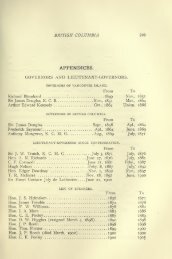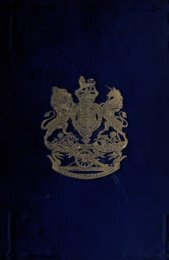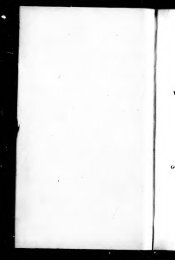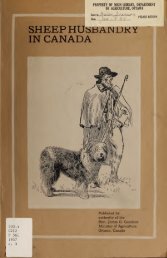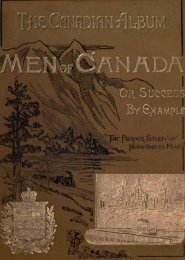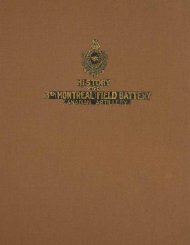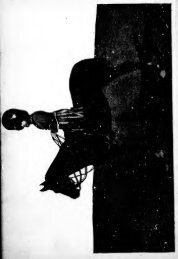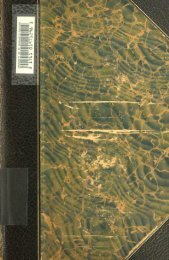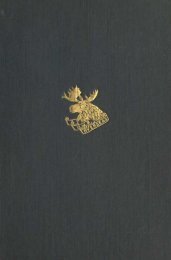- Page 3:
65 S^HJf*
- Page 6:
COPYRIGHT CANADA BY BERNARD McEVOY
- Page 9:
HISTORY OF THE 72nd CANADIAN INFANT
- Page 13 and 14:
I CONSIDER it FOREWORD a great hono
- Page 15 and 16:
PREFACE nnHIS VOLUME is an attempt
- Page 17 and 18:
CONTENTS CHAPTER I. FORMATION OF TH
- Page 19 and 20:
CONTENTS CHAPTER VIII. THE SUMMER O
- Page 21 and 22:
CONTENTS CHAPTER XVI. THE LAST FIGH
- Page 23 and 24:
LIST OF ILLUSTRATIONS Facing Page 6
- Page 25 and 26:
INTRODUCTION npHERE is much that is
- Page 27:
LIEUT. -COL. G. H. KIRKPATRICK, D.S
- Page 30 and 31:
INTRODUCTION of the Fifth was mobil
- Page 33 and 34:
INTRODUCTION wrapped over both shou
- Page 35:
MAJ.-OEN. R. G. EDWARDS LECKIE, C.M
- Page 38 and 39:
SEAFORTH HIGHLANDERS OF CANADA intr
- Page 40:
KK. 1 BATTALION, SK.\K< K TI
- Page 43 and 44:
SEAFORTH HIGHLANDERS OF CANADA inti
- Page 45 and 46:
CHAPTER II. EARLY EVENTS. Officers
- Page 47:
) BATTALION >KAK >KTH
- Page 50 and 51:
SEAFORTH HIGHLANDERS OF CANADA Stua
- Page 52:
72XD BATTU.H N 81 M HCTH 11 Mi H I.
- Page 55 and 56:
SEAFORTH HIGHLANDERS OF CANADA ing
- Page 57:
< -9\D BATTALION, SK.U oKTH
- Page 60 and 61:
CHAPTER IH. THE WAR STARTS. Proclam
- Page 62:
n BVTTAMOX. SKAKOKTH II M
- Page 65 and 66:
SEAFORTH HIGHLANDERS OF CANADA Exhi
- Page 68 and 69:
THE WAR STARTS. the 72nd in that di
- Page 72 and 73:
THE WAR STARTS. Empress of Britain,
- Page 74 and 75:
72ND
- Page 77 and 78:
THE WAR STARTS. Hankley Common. As
- Page 79:
INSPECTION OF 72ND AT HASTINGS PARK
- Page 82 and 83:
certain SEAFORTH HIGHLANDERS OF CAN
- Page 84 and 85:
SEAFORTH HIGHLANDERS OF CANADA raid
- Page 87 and 88:
BAPTISM OF FIRE. dation and blessin
- Page 89 and 90:
BAPTISM OF FIRE. sion of mingled fe
- Page 91:
l> B H p O g w P o O 02 i fc
- Page 94 and 95:
SEAFORTH HIGHLANDERS OF CANADA Brig
- Page 96 and 97: CHAPTER V. HISTORIC GROUND. The mar
- Page 99 and 100: HISTORIC GROUND. in connection with
- Page 101 and 102: HISTORIC GROUND. age and steadiness
- Page 103: - MONTREAL CRATER, VIMY RIDGE ARRAS
- Page 106 and 107: SEAFORTH HIGHLANDERS OF CANADA It g
- Page 108 and 109: SEAFORTH HIGHLANDERS OF CANADA to i
- Page 111 and 112: attempted only to prove impracticab
- Page 113 and 114: HISTORIC GROUND. the alarms of the
- Page 115: M O I H E-i fc M Of 02 O2 O
- Page 118 and 119: SEAFORTH HIGHLANDERS OF CANADA line
- Page 120 and 121: SEAFORTH HIGHLANDERS OF CANADA to i
- Page 123 and 124: VIMY RIDGE. worth while just here t
- Page 125 and 126: VIMY RIDGE. might be told of person
- Page 127: WATCHING A BASEBALL GAME IN FRANCE
- Page 130 and 131: SEAFORTH HIGHLANDERS OF CANADA thro
- Page 132 and 133: SEAFORTH HIGHLANDERS OF CANADA in t
- Page 134 and 135: SEAFORTH HIGHLANDERS OF CANADA ing
- Page 137 and 138: LA COULOTTB. On June 6th all availa
- Page 139 and 140: LA COULOTTE. delle spur. Among the
- Page 141 and 142: LA COULOTTE. he is giving way excep
- Page 143 and 144: LA COULOTTE. and the morning found
- Page 145: D * 1 i o O .2 it
- Page 149 and 150: THE SUMMER OF 17. on by the scouts
- Page 151 and 152: THE SUMMER OF 17. front line just n
- Page 153: - " LA COULOTTE, SHOWING RUINS
- Page 156 and 157: SEAFOBTH HIGHLANDERS OF CANADA robo
- Page 158 and 159: SEAFORTH HIGHLANDERS OF CANADA marc
- Page 161 and 162: CHAPTER IX. PASSCHENDAELE. The Pass
- Page 163 and 164: on the reverse slope dug themselves
- Page 165: THE CLOTH HALL, YPRES MENIN GATE, Y
- Page 168 and 169: SEAFORTH HIGHLANDERS OF CANADA not
- Page 170 and 171: SEAFORTH HIGHLANDERS OF CANADA woun
- Page 172 and 173: SEAFORTH HIGHLANDERS OF CANADA of P
- Page 175 and 176: WATCHFUL WAITING. ly. There had bee
- Page 177 and 178: single WATCHFUL WAITING. and rather
- Page 179: <1 03 fc 3 oa M O r PH O 2;
- Page 182 and 183: SEAFORTH HIGHLANDERS OF CANADA walk
- Page 184 and 185: SEAFORTH HIGHLANDERS OF CANADA ney
- Page 187 and 188: WATCHFUL WAITING and Quartermaster.
- Page 189 and 190: A few days later the courage and WA
- Page 191 and 192: GERMANY S INNINGS. line from Hulluc
- Page 193 and 194: TOP (LEFT TO RIGHT) : ROW LT. C. C.
- Page 196 and 197:
GERMANY S INNINGS. While the Battal
- Page 198 and 199:
GERMANY S INNINGS. was made of smok
- Page 200:
H 9 H I a o fi N fc H W 02 ^&gt
- Page 203 and 204:
SEAFORTH HIGHLANDERS OF CANADA grea
- Page 205:
SEAFORTH HIGHLANDERS OF CANADA of A
- Page 209 and 210:
CHAPTER XII. AMIENS. The general id
- Page 212:
OUNT1 / TOUGtIT 0V TILL Or f\MlLN3.
- Page 215 and 216:
SEAFORTH HIGHLANDERS OF CANADA a na
- Page 217 and 218:
SEAFORTH HIGHLANDERS OF CANADA in t
- Page 219 and 220:
SEAFORTH HIGHLANDERS OF CANADA the
- Page 221 and 222:
SEAFORTH HIGHLANDERS OF CANADA nigh
- Page 223 and 224:
SEAFORTH HIGHLANDERS OF CANADA Comp
- Page 225 and 226:
SEAFORTH HIGHLANDERS OF CANADA main
- Page 227 and 228:
SEAFORTH HIGHLANDERS OF CANADA &quo
- Page 229:
SEAFORTH HIGHLANDERS OF CANADA On t
- Page 233 and 234:
SEAFORTH HIGHLANDERS OF CANADA plea
- Page 235 and 236:
SEAFOBTH HIGHLANDERS OF CANADA all
- Page 238 and 239:
] IN THE HINDENBURG LINE. defenders
- Page 240 and 241:
IN THE HINDENBURG LINE. finest inst
- Page 242 and 243:
IN THE HINDENBURG LINE. ices of a c
- Page 246:
COUNTRY COVERED IN OVflNGE TROtl CM
- Page 249 and 250:
SEAFORTH HIGHLANDERS OF CANADA The
- Page 251 and 252:
SEAFORTH HIGHLANDERS OF CANADA hour
- Page 254 and 255:
CAMERA!. raged upon the first slope
- Page 256 and 257:
:< CAMBEAI. effect of that p
- Page 260 and 261:
CAMBRAI. had fought well, desperate
- Page 262 and 263:
CAMBRAL times its own total strengt
- Page 264:
M W H o H fc (M t-
- Page 267 and 268:
SEAFORTH HIGHLANDERS OF CANADA of &
- Page 269 and 270:
SEAFORTH HIGHLANDERS OF CANADA were
- Page 271 and 272:
SEAFORTH HIGHLANDERS OF CANADA Abou
- Page 273 and 274:
SEAFORTH HIGHLANDERS OF CANADA retr
- Page 276 and 277:
A BEATEN FOE. situated in the house
- Page 278 and 279:
A BEATEN FOE. to make a stand, trus
- Page 280 and 281:
ance with judgment, and the to be a
- Page 282 and 283:
a THE LAST FIGHT. In the centre, th
- Page 286 and 287:
THE LAST FIGHT. out of every nook a
- Page 288 and 289:
THE LAST FIGHT. and north-east. Fro
- Page 290 and 291:
fatal THE LAST FIGHT. M.M., succeed
- Page 292 and 293:
THE LAST FIGHT. Headquarters sat at
- Page 294 and 295:
AFTER THE ARMISTICE. caine general,
- Page 296:
<N cb O M t-
- Page 299 and 300:
SEAFORTH HIGHLANDERS OF CANADA had
- Page 301 and 302:
SEAFORTH HIGHLANDERS OF CANADA Rich
- Page 304 and 305:
AFTER THE ARMISTICE. the canal and
- Page 306 and 307:
AFTER THE ARMISTICE. sports, and ap
- Page 308:
a LIEUT.-GEN. SIR ARTHUR CURRIE, G.
- Page 311 and 312:
SEAFORTH HIGHLANDERS OF CANADA ous
- Page 314 and 315:
AFTER THE ARMISTICE. to the full ju
- Page 316:
<1 os rH OS a O ft 02 h O O
- Page 319 and 320:
CHAPTER XVIII. HOME. Arrival at Bra
- Page 322 and 323:
HOME. operator obtained permission
- Page 324:
W ft o M P4 P S P^ S O PM g E 02 K
- Page 328 and 329:
Chronological Table of Events May 1
- Page 330 and 331:
CHRONOLOGICAL TABLE OF EVENTS. July
- Page 332 and 333:
CHRONOLOGICAL TABLE OF EVENTS. Dece
- Page 334 and 335:
CHRONOLOGICAL TABLE OF EVENTS. May
- Page 336 and 337:
CHRONOLOGICAL TABLE OF EVENTS. Sept
- Page 338 and 339:
CHRONOLOGICAL TABLE OF EVENTS. Dece
- Page 340 and 341:
CHRONOLOGICAL TABLE OF EVENTS. Apri
- Page 342 and 343:
CHRONOLOGICAL TABLE OF EVENTS. Sept
- Page 344 and 345:
CHRONOLOGICAL TABLE OF EVENTS. May
- Page 346 and 347:
SUMMARY OF DISTINCTIONS. SUMMARY OF
- Page 348 and 349:
HCOo-^< t-^Hoo5 ^ ^"^ c
- Page 350 and 351:
<3J Valenc I _ >J &am
- Page 352 and 353:
Hopwood, <D i *" u &
- Page 355 and 356:
i i DATE ACTION t i 0> &
- Page 357 and 358:
o> & 5 o O o HQQ HHO O
- Page 359 and 360:
i i ACTION REGIMENT c" c ^&quo
- Page 361 and 362:
i i t> a o O PS Q O J g M 72
- Page 363 and 364:
ABBREVIATIONS Ma J M -M Major. Mili
- Page 365 and 366:
SEAFORTH HIGHLANDERS OF CANADA Name
- Page 367 and 368:
SEAFORTH HIGHLANDERS OF CANADA Name
- Page 369 and 370:
SEAFORTH HIGHLANDERS OF CANADA Name
- Page 371 and 372:
SEAFORTH HIGHLANDERS OF CANADA Name
- Page 373 and 374:
SEAFORTH HIGHLANDERS OF CANADA 1296
- Page 375 and 376:
SEAFORTH HIGHLANDERS OF CANADA Name
- Page 377 and 378:
SEAFORTH HIGHLANDERS OF CANADA Name
- Page 379 and 380:
SEAFORTH HIGHLANDERS OF CANADA Name
- Page 381 and 382:
SEAFORTH HIGHLANDERS OF CANADA Name
- Page 383 and 384:
SEAFORTH HIGHLANDERS OF CANADA Name
- Page 385 and 386:
SEAFORTH HIGHLANDERS OF CANADA 250
- Page 387 and 388:
SEAFORTH HIGHLANDERS OF CANADA Name
- Page 389 and 390:
SEAFORTH HIGHLANDERS OF CANADA 254
- Page 391 and 392:
SEAFOKTH HIGHLANDERS OF CANADA 256
- Page 393 and 394:
"R ^ SEAFORTH HIGHLANDERS OF C
- Page 395 and 396:
" " " " "
- Page 397 and 398:
SEAFORTH HIGHLANDERS OF CANADA Name
- Page 399 and 400:
SEAFORTH HIGHLANDERS OF CANADA Name
- Page 401 and 402:
SEAFORTH HIGHLANDERS OF CANADA Name
- Page 403 and 404:
SEAFORTH HIGHLANDERS OF CANADA 268
- Page 405 and 406:
SEAFORTH HIGHLANDERS OF CANADA Name
- Page 407 and 408:
SEAFORTH HIGHLANDERS OF CANADA Name
- Page 409 and 410:
SEAFORTH HIGHLANDERS OF CANADA Name
- Page 411 and 412:
SEAFORTH HIGHLANDERS OF CANADA Name
- Page 413 and 414:
SEAFORTH HIGHLANDERS OF CANADA Name
- Page 415 and 416:
SEAFORTH HIGHLANDERS OF CANADA Name
- Page 417 and 418:
SEAFORTH HIGHLANDERS OF CANADA Name
- Page 419 and 420:
SEAFOETH HIGHLANDERS OF CANADA Name
- Page 421 and 422:
SEAFORTH HIGHLANDERS OF CANADA Name
- Page 423 and 424:
SEAFORTH HIGHLANDERS OF CANADA Name
- Page 425 and 426:
SEAFORTH HIGHLANDERS OF CANADA Name
- Page 427 and 428:
" " SEAFORTH HIGHLANDERS
- Page 430 and 431:
The War Services of the /ind Regime
- Page 432:
OFFICERS AND OTHER RANKS SUPPLIED F
- Page 435 and 436:
pi 3 o O O o r-H rH EH O EH 3 r CO
- Page 437:
I I g o O O 1 3 o fe o 02 w 02 o CO
- Page 442 and 443:
INDEX Abraham Heights, 77. Abscon,
- Page 444 and 445:
INDEX Herissart, 26. Hersin-Coupign
- Page 446:
INDEX Sallumines Hill, 74, 75. Sanc



